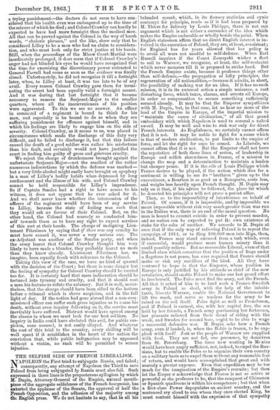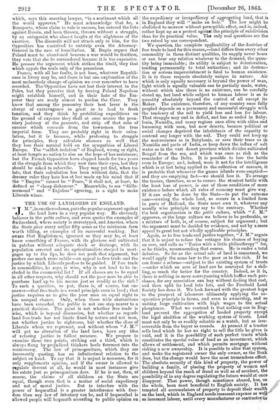THE SELFISH SIDE OF FRENCH LIBERALISM.
NA.POLEON the First tried to subjugate Russia, and failed ; consequently, any attempt of Napoleon the Third to save Poland from being subjugated by Russia must also fail. Such expressed in three lines is the preposterous syllogism by which M. Dupin, Attorney-General of the Empire, natural mouth- piece of the aggregate selfishness of the French bourgeoisie, has extorted the applause of the Senate, the approval of half the French Opposition, and the adhesion of the majority among the English press. We do not hesitate to say, that in all his belauded speech, which, in its flowery statistics and cynics contempt for principle, reads as if it had been prepared by M. Thiers for delivery by Louis Phiiippe, there is not one argument which is not either a surrender of the idea which makes the Empire endurable or wholly beside the point. When English statesmen affirm that no direct English interest is in- volved in the execution of Poland, they are, at least, consistent; for England has for years allowed that her policy is to avoid all wars not needful to self-defence. When Earl Russell inquires if the Count Zarnoyski wishes a fleet to sail to Warsaw, we recognize, at least, the self-restraint which never menaces till it is prepared to strike hard. But the French Empire exists, because it professes things other than self-defence,—the propagation of lofty principles, the regeneration of old nationalities,—because it admits, in short, the possibility of making war for an idea. If it has no such mission, it is in its external action a simple nuisance, a vast disturbing force, which taxes, alarms, and arrests all Europe, in order as compensation to secure something sufficiently secured already. It may be that the Emperor sympathizes with M. Dupin, but, in that case, let us hear no more of the lead of the Empire in Europe, of the imperial mission to "maintain the cause of civilization," of all that grand embroidery with which Napoleon is used to conceal a naked sword. It may be well and wise to risk war only for direct French interests. As Englishmen, we certainly cannot affirm that it is not. It may be noble to fight for a cause which is that of modern civilization, to put limits to the empire of force, and let the right for once be armed. As Liberals, we cannot affirm that it is not. But the Emperor shall not have the reputation of both those lines of action, of leadership in Europe and selfish shrewdness in France, of a mission to change the map and a determination to maintain a leaden but cheaper peace. If it is the rat+ of Louis Philippe which France desires to be played, if the nation which dies for a sentiment is willing to see its " brethren " given up to the executioner, a Bourbon is as good as a Bonaparte, costs less, and weighs less heavily upon French thought. M. Dupin may rely on it that, if his advice be followed, the place for which he deserted his principles will not prove a patent office.
Then, as to the impossibility of interference on behalf of Poland. Of course, if it is impossible, and by impossible we mean impossible without risk very much greater than was run in the Italian war, there is an end of the moral question. No man is bound to commit suicide in order to prevent murder, and no nation can be expected to put its own existence at stake for the sake of another. We concede to M. Dupin at once that if the only way of relieving Poland is to repeat the campaign of 1814, or to fling 100,000 men into Riga, then, indeed, France may stand excused from a task which, even if successful, would produce more human misery than it could possibly relieve. But no reasonable Liberal, even of that limited class which conceives that the position of frogs under a flagstone is not peace, has ever required that France should make or risk any sacrifices of the kind. All they have ventured to hope is that the Emperor, whose position in Europe is only justified by his attitude as chief of the new revolution, should enable Poland to make one last grand effort to free herself. The Poles must find the army, not the French. All that is asked of him is to land such a Franco-Swedish army in Poland as shall, with the help of the inhabi- tants, liberate Warsaw, enable the National Government to lift the mask, and serve as nucleus for the army to be raised on the soil itself. Poles fight as well as Frenchmen, and if Poland is earnest, she, with her capital free, the sea held by her friends, a French army garrisoning her fortresses, her peasants relieved from their dread of siding with the weak, and Sweden for second base, ought to be able to wage a successful defensive war. II. Dnpin asks how a French army, even if landed, is, when the Baltic is frozen, to be sup- plied with food? Just as the people of Warsaw are supplied with food. They are not fed, one presumes, by donatives from St. Petersburg. The force now wasting in Mexico would have been amply sufficient, not, indeed, to expel the Rus- sians, but to enable the Poles so to organize their own country on a military basis as to expel them without any reasonable fear of return, and would have accomplished that great end with scarcely a greater expense. Even that expedition may be too much for the imagination of the Empire's recruits; but then let the Empetir acknowledge that France is not so active or powerful as she professes to be, that the conquest of Chinamen or Spanish quadroons is within his competence ; but that when a first-class Power depopulates an ancient country, and the sentenced cry aloud to one whom they once elected King, he must content himself with the expression of that sympathy which, says this sneering lawyer, "is a sentiment which all the world approves." He must acknowledge that he, a Bonaparte, whose claim to rule is success, has entered the lists against Russia, and been thrown, thrown without a struggle, by an antagonist who almost laughs at the slightness of the exertion. The discredit will not attach only to him, for the Opposition has contrived to outstrip even the Attorney- General in the race of humiliation. M. Dupin argues that Poland must be abandoned because a war would be fruitless, they vote that she be surrendered because it is too expensive. He presses the argument which strikes the timid, they that which appals the souls only of the penurious.
France, with all her faults, is not base, whatever Republi- cans in livery may be, and there is but one explanation of the most melancholy change of opinion we ever remember to have recorded. The Opposition have not lost their interest in the Poles, but they perceive that by freeing Poland Napoleon might establish himself, and in their hate of the Em- peror they are ready almost to pardon the Czar. They know that among the peasantry their best lever is the charge of extravagance so great as to lead to fresh taxation, and they think by prohibiting expeditions on the ground of expense they shall at once arouse the pecu- niary jealousy of the peasants, and strip off that robe of success which conceals from the townsmen the true imperial form. They are probably right in their calcu- lation, but it is because, while professing to struggle for principles, they calculate chances so well that they lose their natural hold on the sympathies of Liberal Europe. The "selfish isolation" of England, wrong or right, at least tempts no nation to rise on the hope of her assistance; but the French Opposition have clapped hands for two years at the struggle from which they now turn their eyes, lest they should be asked to subscribe. They may yet find, when too late, that their calculation has been without data, that the dreamy ruler they hate has at last made up his mind that if the "Empire" cannot be "Peace," it shall not, at least, be defined as "cheap dishonour." Meanwhile, to see " Gille- normand " and " Enjolras " agreeing, is a sight to make Liberals wince.































 Previous page
Previous page